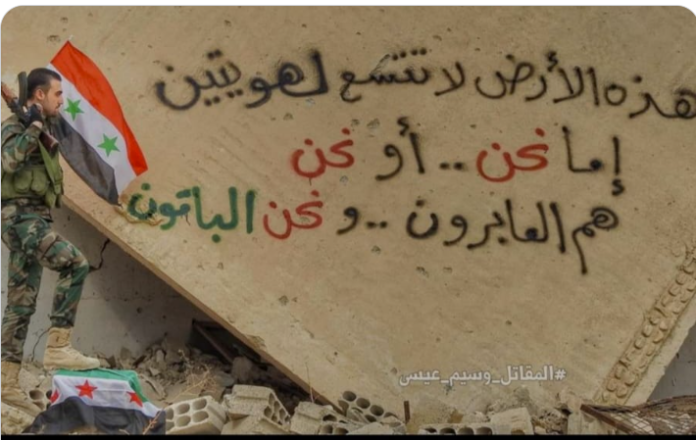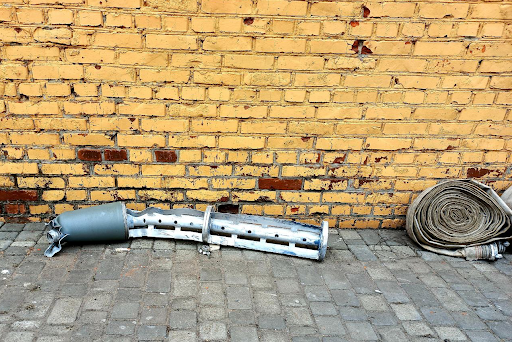(Written in Arabic last year)
Edited by Rida Ali
The #Syrian state suddenly faced an unprecedented war on March 15, 2011. The aggressors did not declare direct war on it, but it had to confront a cosmic terrorist war. It was presented to the world as a civil war, while in reality, it was a war backed and supported by a #Western and regional alliance comprising more than 130 countries under the guise of the “Friends of the Syrian People” group. Led by the #US government and supported by hundreds of thousands of amateur killers and criminals coming from all corners of the earth, in addition to the bias of the United Nations and its humanitarian organizations. Despite the immense and terrifying human and material losses inflicted by the war on Syrian society and economy, the Syrian state has persevered and reclaimed the majority of Syrian territories, but the war is not yet over. According to exclusively relying on data and information from the World Bank and United Nations organizations such as ESCWA and FAO, the cosmic war on Syria is simply a war of existence or non-existence for the state. Before 2011, there was self-sufficiency and a strong economy, with all social and economic indicators being good. National production covered between 75% to 85% of the basic needs of Syrians, and the surplus was exported to more than 60 countries. Basic goods and services such as bread, medicine, energy, healthcare, and education were available at cheap prices or for free. According to the FAO (2018), Syria was the “only country in the region enjoying self-sufficiency,” and the national economy was also strong and diverse. According to the World Bank (2017), the gross domestic product witnessed a high and sustainable growth rate between 2000-2011.
During the period 2011-2018, according to ESCWA, the war on Syria is considered one of the most brutal and destructive wars since World War II. This war has been tantamount to genocide of the Syrian people, with the looting of its wealth and the theft of its heritage. The first eight years of the war were more than enough to deliver a devastating blow to the developmental projects and achievements that the Syrian state had accomplished since independence. According to ESCWA (2020) and the World Bank (2017), the war inflicted severe economic, social, and humanitarian damages and losses. Economically, the war caused significant destruction to the national economy, resulting in a substantial decline in overall economic indicators and a massive increase in inflation and unemployment rates. According to the World Bank (2017), the Gross Domestic Product (GDP) declined from $61.4 billion in 2010 to $20 billion in 2017. Concurrently, the exchange rate of the Syrian pound plummeted from 46 SYP per dollar in 2010 to over 650 SYP per dollar in 2017, now reaching over 14,000 SYP. Inflation and unemployment rates witnessed a staggering rise during this period, with inflation soaring by over 800% from its 2011 level and the unemployment rate jumping from around 8.5% to 55% in 2017.
On the social front, the war caused the largest humanitarian catastrophe in modern history, with hundreds of thousands of casualties, wounded, and the largest wave of displacement and refuge in contemporary history (more than 12 million refugees and displaced persons). Additionally, the war led to the destruction of livelihoods for the largest human population in modern history. According to ESCWA (2022), the extreme poverty rate skyrocketed from 1% in 2010 to 40% of the total population in 2017, now reaching 90% of the total population. The number of Syrians in need of humanitarian assistance increased from a few hundred thousand before the crisis to over 13.1 million people, including 5 million children in 2018. Furthermore, the war also led to a significant deterioration in healthcare and educational services, the spread of infectious diseases, and the presence of over 3 million out-of-school children in 2017.
Moreover, one of the consequences of this war is the emergence of mediators and brokers, contributing to the rise of a wealthy class of warlords and smugglers, and widespread corruption throughout the country.
For the sake of prolonging the war and increasing the suffering of Syrians even further, the US government decided to take more severe and stringent measures than before, issuing the so-called “Caesar” law, which came into effect in June 2020, at the height of the coronavirus crisis. This law prohibits dealing with the Syrian state and its commercial and banking institutions in order to cripple the Syrian economy.
The complete blockade imposed by this law on Syrian external economic relations led to almost complete cessation of economic activity in the country, resulting in the collapse of the Syrian pound exchange rate and the decline in purchasing power for the vast majority of Syrians. After the law came into effect in 2020, the Syrian pound exchange rate plummeted from around 1000 pounds per dollar at the end of 2019 to over 1400 pounds per dollar now. Additionally, the GDP lost more than 25% of its value, and with the collapse of GDP and the Syrian pound exchange rate, inflation rates soared, leading to a collapse in the purchasing power of wages and salaries, contributing to increased poverty and deprivation for the vast majority of the Syrian people. After the law’s implementation in 2020, the extreme poverty rate rose from 40% in 2019 to over 90% in 2022.
Politically and socially, the so-called Caesar law aims to convince people that their daily hardships, extreme poverty, and living conditions are not due to external aggression or blockade and harsh, unjust measures, but rather due to the inefficiency and failed policies of the state and the spread of corruption within it. By contributing to the spread of poverty, deprivation, and corruption, the law also aimed to compel Syrians to flee their country, deport elites and bright minds to dismantle the fabric of the country and hinder its reconstruction. However, the general and most important goal of such measures and laws was to break the will of the Syrian people and compel them to accept American and Zionist dictates and conditions.
Twelve years of war, terrorism, occupation, destruction, looting, siege, migration, displacement, poverty, and deprivation have brought about a fundamental change in the structure of both the Syrian individual, society, and state. The human and material losses are immense and terrifying for a country whose population did not exceed that of a large city before the war, approximately 24 million, and whose GDP ($61.4 billion in 2011) is no more than the capital of a medium-sized company in Europe. The human and material damages exceed unreasonable limits. Tens of thousands of martyrs and wounded, millions of displaced people (meaning one out of every two Syrians), collapse of GDP and the purchasing power of Syrians, reconstruction costs amounting to approximately $400 billion. More importantly, however, is the destruction of the means of life for the largest human bloc in modern history, with over 90% of Syrians living below the extreme poverty line, deterioration of public and health services, scarcity and shortage of fuel and electricity due to their theft and smuggling by the US government’s warning. Syrians now live with only four hours of electricity supply compared to 20 hours of power outage.
Despite this grim reality, there are various positive indicators. The Syrian state has stood firm and has not collapsed, it is still standing and beginning to adapt to this new reality. Secondly, the Syrian people, despite the tragedies and pains they currently endure, still stand behind their state and army. The suffering of the Syrian people, which has been ongoing for more than a decade, has not ended yet. This is the price of belonging to a homeland considered undoubtedly one of the most beautiful and ancient homelands, and it is the same price that our ancestors paid thousands of years ago against the hordes of invaders, which ended each time with the defeat of the invaders and the victory of Syria and its revival.
شكرا جزيلا للدكتور Julien Baddour
READ MORE:
Video: Crimes Against Syria – Global ResearchGlobal Research – Centre for Research on Globalization


















